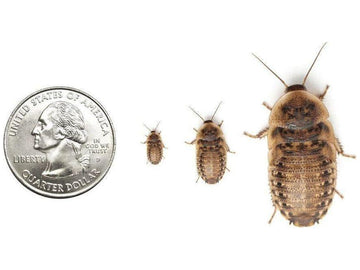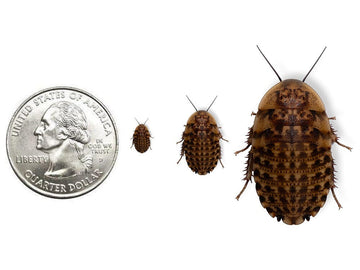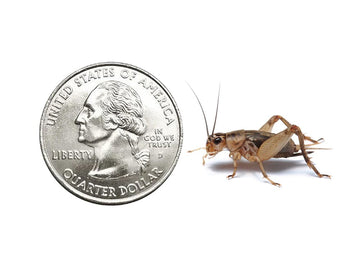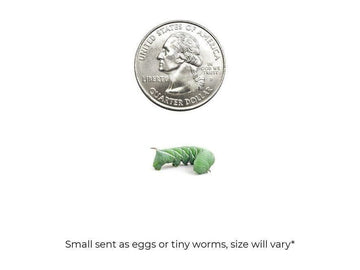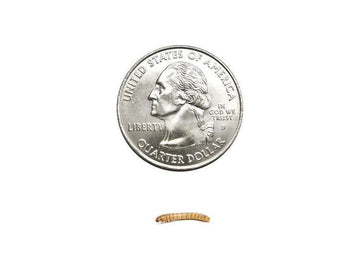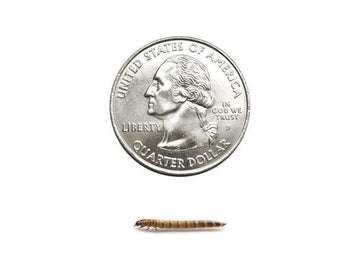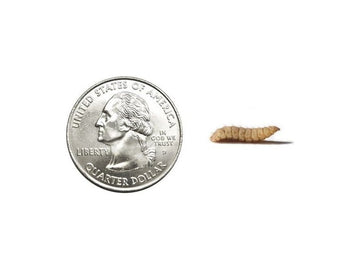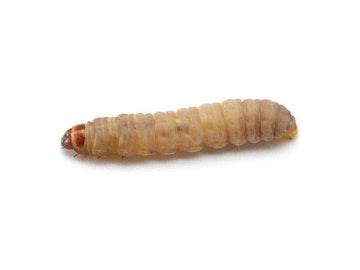Dubia Roach Care Sheet
IMPORTANT: Please be aware that we DO NOT recommend starting your own dubia roach colony. It is common for people to develop an allergy to dubia roaches with too much handling and constant exposure. You might save money long term, but it may not be worth the risk. Handling your dubia roaches in a well-ventilated room, and wearing gloves and a respirator can help reduce the chances of developing an allergy. Our facility is equipped with high-quality air filtration and ventilation systems, and we always wear gloves and respirators to keep the risk to a minimum. Please note that the reactions will start with itchy skin, then move on to itchy eyes, congestion, and ultimately lead to respiratory issues. Let us provide your dubia roaches as you need them with minimal exposure and risk of developing allergies.
Housing
Dubia roaches need to be housed in containers with smooth sides, so they are not able to climb out of their enclosure. Although they are not known to climb, they will be able to use rough-surfaced walls as toe holds and may reach the top of the enclosure. Glass aquariums, 10 gallons at a minimum, or plastic tubs, 40 qt. at a minimum, can be used. Although the roaches can't climb, it's wise to cover their enclosure so unwanted materials, pests, or household pets can't get in. Aquariums can be covered with mesh screen covers used for reptiles. Most plastic tubs are sold with heavy-duty plastic covers. In order to provide ventilation for a plastic tub, cut a hole in the cover, at least 6”x6” and hot-glue some vinyl mesh over the opening.

Dubia roaches need places to stand and places to hide. Cardboard egg crate flats provide the most surface area per square inch. You may be able to get egg crate flats from a bakery or store like Walmart or you can buy them from us. It's best to stack the egg crate flats vertically so the Dubia roach droppings fall to the bottom of the enclosure. Make sure that the cover is on tightly and that the egg crate doesn't extend so close to the top of the enclosure that the roaches can step out.
Heat and Humidity
Although Dubia roaches can survive at room temperature, they require an ambient temperature of 90-95 F to successfully breed, and do best with about 60% humidity. If you have an area of your home that naturally reaches the required temperature there is no need for an additional heat source. If heat is needed, it can best be provided by using a ceramic heat emitter, an Under Tank Heater (UTH), or coated heat cable. The ceramic heat emitter should be installed at the top of the enclosure to radiate heat downward; the UTH can be attached to the side or bottom of the enclosure. If the UTH is to be placed on the outside bottom of the enclosure, be sure to raise the tub or tank at least 1/4" to vent the heat (most UTH's come with plastic "feet" that can be installed. Small tiles or shims could also be used). In order to control the temperature of the UTH and to prevent an overly hot UTH from melting a plastic enclosure, use a thermostat or a lamp dimmer (rheostat) to keep the temperature in the low to mid 90's. The warm temperatures and use of water crystals for hydration (see below) should lead to appropriate humidity. There is no need to use any kind of substrate or bedding at the bottom of the enclosure. Adding substrate will only make it more difficult to keep the enclosure clean.
Food and Water
Good nutrition and hydration result in healthy Dubia roaches. Healthy Dubia roaches provide equally good nutrition to the animals that feed on them. Roaches can eat a variety of dry fruit, grain or plant-based food including: commercially available Roach Chow, powdered grains, commercially available insect gutload, a variety of Organic fruits and vegetables, especially orange ones which contain carotenoids. Be sure to thoroughly wash all Organic produce before offering it your your Dubia. Low moisture vegetable parings such as potato or other parings, apple cores or broccoli stalks can also be added. Be sure to remove fruit and vegetables before they get moldy; mold is lethal to roach colonies. Avoid high protein foods such as dog or cat food and meat, since Dubia roaches convert excess protein into uric acid which can harm the reptiles that eat them.

The most effective way to provide water is by using water crystals, a polymer based material that holds water. This method will minimize the chance of the roaches drowning. Be sure to put the food and the water in shallow bowls that the Dubia roaches can climb in and out of and to keep the food and water bowls separate so the food doesn't get wet and moldy.
Cleaning
Dubia Roaches produce dry droppings called "frass". Their enclosures will need to be cleaned every 1-2 weeks to reduce buildup of frass and shed exo-skeletons. It's useful to have an extra enclosure when cleaning. Transfer the egg crate flats with the Dubia Roaches and the food and water dishes (which may contain roaches as well) to the extra container. Scoop up what remains at the bottom of the enclosure and sift out the frass. The roaches that remain can then be transferred to the extra enclosure as well, or put back into the original enclosure with the other materials.
Important Note
Some people can develop an allergy to dubia roaches or their frass (droppings) with too much handling and constant contact. This is more likely to occur if you are breeding roaches, since it will dramatically increase the intensity of contact. The best way to avoid developing an allergy is to handle your Dubia roaches in a well ventilated room, and wear gloves if possible.
Summary of Materials for Roach Care
- Aquarium (at least 10 gallon) or plastic tub (at least 40 qt)
- Enclosure cover (vinyl mesh and hot glue gun needed if converting a plastic tub cover)
- Ceramic heat emitter, UTH or heat cable
- Thermostat or lamp dimmer if a UTH or heat cable is used
- Egg crate flats
- Water crystals
- Roach food
- Shallow bowls
- Extra enclosure to use when cleaning
Want to know more about Dubia roaches? Check out this wikipedia article https://en.wikipedia.org/wiki/Blaptica_dubia

